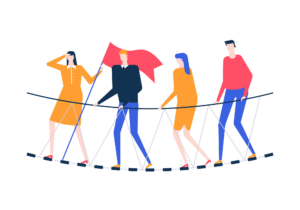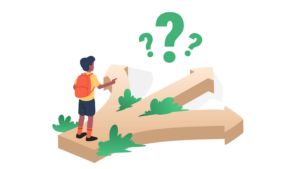Like Steve Jobs, who was famous for his signature black turtleneck and jeans as a daily uniform, I have also worn a black shirt and jeans (or black joggers) every day since I can remember. It’s weathered an 80-lb. weight loss, hot days, cold days, rainy days, travel, and sitting at home on the couch.
The reason for me (and as rumored for Steve Jobs?), the fewer decisions I have to make each morning, the more energy I find at the end of my day.
How many decisions do we make on average in a day?
While it depends on the individual and their lifestyle, most people make 100-200 decisions every day. That’s a lot of choices our brain has to process.
A study by the Max Planck Institute found that our thinking becomes impaired after 8 hours of decision-making (PNAS).
Consider that, on average; it takes people 23 minutes and 15 seconds to recover from decision fatigue (Psychology Today) – this means after 8 hours of it, humans require 185 minutes and 20 seconds (roughly 2 ½ hours) to return to balance.
What happens when we’re “decision-fatigued”?
Decision fatigue is a term used to describe how exhaustion from making too many decisions can cause us to be more likely to select a bad or sub-optimal choice. When inundated with decisions throughout the day, our mental energy depletes with each “this or that?”.
Considering the time of day you are reading this, consider how many decisions you have already made. How many more will you have to make before you sleep tonight? If thinking about it makes you exhausted, you get it.
It’s been shown that fatigue can lead us to make more rushed, hasty decisions, and with fewer safety checks in place – this is where decision fatigue carries its greatest risk.
It also impairs our willpower. According to Psychology Today, people are twice as likely to select unhealthy snacks when decision fatigue is present.
Fatigue needs to be factored in whenever an important decision needs to be made. Not recognizing how fatigue affects our mental faculties and ability to think critically will ultimately result in costly errors.
How to Identify Signs of Decision Fatigue
If you want to identify signs of fatigue, listen to yourself: if you hear yourself expressing a great deal of impatience or letting out a heavy sigh before making a decision, this could be taken as a sign that fatigue has set in.
Another sign may be difficulty concentrating while thinking through and analyzing a problem before making your choice – this could suggest fatigue from too many decisions.
In a pinch, use the HALT method. If you are one of these, then making a decision is not in your best interest.
-
- H – Hungry
- A – Angry
- L – Lonely
- T – Tired
Strategies for Reducing Decision Fatigue
We must learn to manage decision-making effectively to preserve a healthy attitude and outlook. One of the most effective ways is to develop habits and rituals. This involves setting up a decision-making system that minimizes the required decision-making.
It’s worth noting that decision-making habits and rituals can take more or less time, depending on the complexity of the decision-making process. It takes, on average, 22 days to develop a new habit.
One way to do this is by automating decision-making processes, such as setting up automatic bill payments or pre-selecting meals for the week.
Make a list of just 3-5 things you can eliminate from your day. You have to start somewhere. Pick the lowest-hanging fruit, things that come to you right away.
For example, packing a lunch the night before or picking out an outfit for the next day can help you avoid decision-making fatigue in the morning.
It’s important to be aware of our limits and take frequent breaks when decision-making becomes too overwhelming – this allows us to clear our minds and come back with fresh, clear thinking.
Taking short walks or listening to music with your eyes closed are two great ways to reduce decision fatigue, as they allow us to develop a “soft focus” away from any decision at hand and clear our minds for a reset.
Engaging in creative activities such as painting, drawing, or writing can help recharge our mental energy and make decision-making easier. Lastly, considering that decision fatigue is often linked to lack of sleep, it’s important to get enough rest to make better decisions.
If making any decision is becoming too difficult or overwhelming, give yourself some grace and take a break if needed.
Start Simple: Pair Down What You Wear Or Eat Every Day
This is what I did, in being OK with sacrificing any fashion FOMO I might have in exchange for a simpler, consistent daily wardrobe commitment – my black t-shirt and jeans.
I no longer have to spend time selecting an outfit each day, which allows me to focus my thoughts in the morning to prep for the day, making more runway for me to show up how I intend for my clients and consciously embodying a mindset of gratitude.
How to tackle the big stuff
Recognizing fatigue in the short term can help you feel more balanced and focused in the now. But what about the big stuff? The longer-term or more complex decisions usually include more people and fewer things you can control.
In the words of Desmond Tutu, “the only way to eat an elephant is one bite at a time.”
Breaking larger goals down into manageable tasks will make decision-making easier and take the sting out of being disappointed when things you can’t control don’t turn out how you thought they would.
Even for the large decisions, do your best to set your intentions for what you want from experience to allow room for agility when things don’t go exactly to plan.
Final Thought
Protecting yourself from unnecessary complexities means keeping your eye on simplicity to reduce the decisions causing fatigue. For me, that was my predictable, go-to daily uniform.
For you, it may be setting the coffee pot to brew the night before or leaning into a short walk after lunch to clear your head with some fresh air.
Whatever it is, I promise the one thing you won’t have to decide on is missing your daily end-of-the-day weariness.






